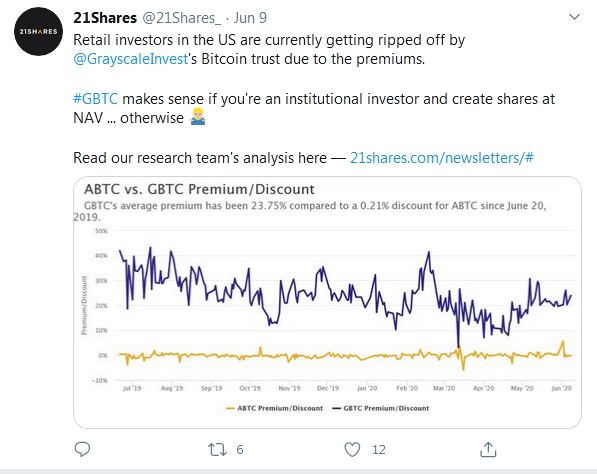Key Takeaways
- Statistically, institutional investors in Europe hold more crypto than U.S. investors.
- This distinction may be due to ease of access within the European Union.
- Firms like Wilshire Phoenix in the U.S. are, however, hoping to change this dynamic.
Last month, Fidelity reported that European institutional investors hold nearly twice as much crypto as U.S. counterparts. And with zero-interest-rate policies taking over, U.S. funds may soon try to fill this gap with Bitcoin. There’s just one problem.
A Winding Road to Bitcoin
The crypto-verse has long heralded the moment institutional investors join the Bitcoin bandwagon.
It would be a 0 to 1 moment, a binary shift from obscure Internet money to a dominant market force. And though commentators celebrated the entrance of Renaissance Tech and Paul Tudor Jones, the trend hasn’t caught on.
Part of the problem has been access. Though both of the funds mentioned above are exposed to BTC, neither is actually holding Bitcoin. They are instead trading futures from the Chicago Mercantile Exchange (CME).
Launched in 2017, the CME Bitcoin futures were the first bridges to traditional finance. It was easy to understand, and money managers recognized the asset even if they didn’t fully understand the underlying commodity. The BTC futures indicated that the crypto market was maturing.
The launch inspired other firms like VanEck, Bitwise, Wilshire Phoenix, and the Winklevoss Twins to try their hand at even more products. So far, no firm has successfully landed a filing.
The SEC has time and again rejected every single exchange-traded fund (ETF). Their primary concerns have been market volatility and market manipulation.
Wilshire Phoenix’s product took these two points to heart when filing for a Bitcoin ETF back in 2018. The United States Bitcoin and Treasury Investment Trust balanced Bitcoin and U.S. Treasury bills to address SEC’s volatility concerns.
More importantly, though, Wilshire’s product was built on top of the already regulated CME futures, specifically its Bitcoin Reference Rate (BRR). The CME’s independent oversight committee also reviews this rate periodically to ensure its integrity. This would help mitigate market manipulation across several top exchanges.
Despite checking all of the regulatory boxes, the SEC blocked what appeared to be a near-perfect application. Hester Peirce, the agency’s commissioner, said that the SEC’s decision “evinces a stubborn stodginess in the face of innovation.” It was one of the first times that a commissioner has ever made such a statement.
But with so many companies being rejected despite their responsiveness and perseverance, Peirce’s letter raises legitimate points.
Wilshire hasn’t given up either; in June, they filed for a publicly-traded fund. A wholly new product, the Bitcoin Commodity Trust, would be made up of only Bitcoin and, if approved, would trade on OTC desks like any other security.
In an interview with Crypto Briefing, Garrette Furo, a partner at Wilshire, said:
“We are trying to give the market what it deserves. Investors will have exposure to Bitcoin via publicly-trader shares using more familiar, traditional brokers. There are no confusing custodial concerns to worry about. Investors just want access to what we believe is a valuable financial asset and we want to solve this.”
The filing is still under review, but Furo looks forward to working with the SEC should they have any comments on the filing. If approved, the product would offer investors a similar opportunity to Grayscale’s Bitcoin Trust (GBTC).
Though popular, interested investors pay a hefty premium to enjoy access. At the time of press, purchasing the equivalent of one BTC via Grayscale will cost investors $10,071, a $782 markup.

But as the United States navigates through red tape and an uncertain financial regulator, Europe’s investor demographic has been steady loading up on their crypto holdings.
A Union of Crypto Investors
In Europe, the crypto ETP movement has been full steam ahead. 21Shares, a Swiss company offering various crypto ETPs, has been at the center of these initiatives.
In February, Börse Stuttgart listed a Bitcoin ETP that let investors profit from any drops in the leading cryptocurrency. In June, Xetra, a digital exchange operated by Deutsche Börse, listed another Bitcoin ETP.
And at the beginning of this month 21Shares, also listed their Bitcoin ETP on the Deutsche Börse.
Though these are all German trading platforms, citizens throughout the European Union will have access to these products. “We offer investors here in Europe a very transparent and trusted ETP product,” Sina (NASDAQ:SINA) Meier, the managing director of 21Shares, told Crypto Briefing. And like Wilshire, traditional investors needn’t worry about complicated key storage.
21Shares top ETPs are Bitcoin, Ethereum, and an index of the top five cryptocurrencies.

There are other factors besides access that influence investors’ appetite for crypto.
A preference for cash and saving money is at the heart of the German economy, for instance. Many countries in the Union are also acutely aware of many of the privacy concerns tied to platforms like Facebook (NASDAQ:FB). Each of these characteristics influences investors’ preferences.
Still, it cannot be denied that European investors have a wider selection when it comes to crypto exposure. Beyond the top three ETPs, 21Shares offer investors a total of 11 different products.
What’s more, this exposure costs far less than it does in the United States currently. However, Wilshire’s upcoming publicly-traded product has a fee of only .90% per annum.
For now, U.S. investors don’t mind paying this premium, but as their European counterparts pull ahead, firms like Wilshire will become more and more important for institutional adoption. Hopefully, regulators agree.
